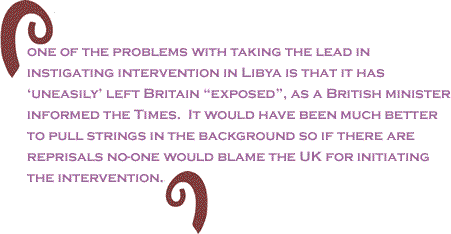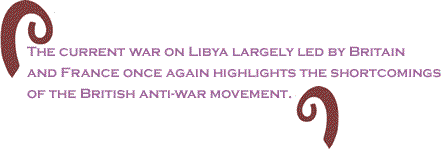The
current war on Libya largely led by Britain and France
once again highlights the shortcomings of the British
anti-war movement.
In
the run up to the war on Iraq in 2003 and many years afterwards,
many of the leading individuals within this movement circumvented
the fact that Britain was invading Iraq for its own interests.
Instead they mischievously popularised the notion that
Tony Blair was beholden to George W. Bush. The latter,
they strongly claimed, was dragging the former along into
this illegal venture.
[1]
Blair,
they inveterately argued, was not a co-partner, co-conspirator
and co-leader in this military enterprise but a mere �poodle�.
[2] The poor soul had his innate and natural sincerity
taken advantage of by big bad George W. Bush; he was seduced
by the power of a photo-op on the Oval office�s green
lawn and at times he was even �stabbed in the back� for
his noble efforts on behalf of Bush. [3] ���
We
now know nothing could be further from the truth.
Unbowed
and unlike George W. Bush, Blair is now on record as saying
that if the �Weapons of Mass Destruction� pre-text wasn�t
available in the run-up to the Iraq war he would have
used some other excuse.
[4] A firm affirmation that Blair invaded Iraq under
no political, economic and cultural duress from Bush.
The
legacy to refuse to face up to Britain�s own independent
motives in invading Iraq lives on, quite seamlessly and
shamelessly, in the current intervention in Libya. The
leaders of the anti-war movement by-pass and circumvent
the fact that Britain was probably the most eager country
to intervene.
As
soon as the British led intervention of Libya began with
the NATO bombing on the 19th of March, Andrew
Murray, a leader in the �anti-war movement� was quick
off the blocs in blaming the Arab League�s �despots� for
the bombing and the UN resolution which supposedly authorised
it. He claimed the latest military venture was �instigated�
by the Arab League.
[5]
It
is truly remarkable how he ignored the campaign in the
British media and especially the right-wing media from
late February onwards to intervene in Libya.
My
focus here is deliberately on the main bugles of the right-wing
media, the Daily Telegraph and the Times, because by virtue
of at least their circulation figures, they are the most
consequential.����
On
the 26th �February, the Telegraph
reported on a joint Anglo-French plan to impose sanctions
on Libya at the United Nations. [6] There was no Arab involvement here. In the
Times, a journalist informs us that it is �time for Gaddaffi
to leave�. [7]

In
the week commencing 28th February, the British
media stepped up the tempo in promoting intervention.
In the Times, Deborah Haynes, reported that �Britain was
ready to use force�. [8] The report goes on to say that:
�Going
further than any world leader, David Cameron said yesterday
that he had ordered General Sir David Richards, the Chief
of the Defence Staff, to work on how to impose a no-fly
zone in Libyan airspace. Fighter jets would shoot down
any encroaching Libyan aircraft...�
In
the Telegraph, the British urge to drop bombs on Libya
was dressed up as a western initiative to do so: a report
claimed that the �West is ready to Use Force against Gaddaffi.� [9] For David Cameron, the British Prime Minister,
��Gaddafi�s
departure was Britain�s �highest priority�, adding: �If
helping the opposition would somehow bring that about,
it is certainly something we should be considering.��
[10]
As
such certain individuals close to the British military
informed the readership that it was ready for a �Libyan
mission�.
[11] ��
One
can easily see, that all �instigation� came from David
Cameron and Blighty�s right-wing media. None of the �Arab
despots� were making any noises to intervene at this time.
However,
British plans for intervention hit a stumbling block according
to Christopher Hope of the Telegraph, when other world
leaders shunned the idea.
[12]
Coupled
with the British urge or instigation to intervene in Libya
in the right-wing media, was another bout of British Obama-bashing.
[13] British militarism is not keen on Obama. The
British right-wing media seemed to have identified that
the American administration and specifically Obama, were
not as enthusiastic as they, in wanting intervention in
Libya.
�Waiting
for Washington� declared the The Times in late February
as it praised the success of Geroge W. Bush and Tony Blair
in the �War on Terror� and compared their decisiveness
and clarity with Obama�s �hesitancy�.
[14] In another editorial titled the �Essence of
Indecision� the paper urged Obama to show �leadership�
and referred to ex-Defence Secretary Robert Gates�s rebuke
of David Cameron�s call for military intervention as �inglorious�.
Naturally, because the Obama administration wasn�t then
keen on intervention it accuses it of �sowing discord�
amongst the western alliance as well as accusing Gadhaffi
of using foreign mercenaries and child soldiers. [15]
On
the 10th March a report in the Times, confirms
that it is Britain that is taking the lead in wanting
intervention and delightedly declared that there is a
�glimmer of hope� in the Obama administration in that
it is maybe coming round to seeing the Libyan situation
their way:
�...British
and French officials seeking quicker action from the US,
the White House distanced itself for the first time from
a policy tied to UN approval, creating a chance for rapid
movement after indecision by the White House.�
[16]
On
the 11th March, a report in the Telegraph openly
asked what Obama�s strategy is:
�Is
it cowardice? Is it indecisiveness? Or is it clever diplomacy?�
before
concluding that because of �America's size and military
power, the American president does not have the option
to remain neutral indefinitely�� [17]
A
comment piece, in the Sunday Telegraph on the 13th
March, contrasted Cameron�s urge to intervene in Libya
with Obama�s �paralysis�. The author goes go on to �hope�
that Obama �follows Cameron's lead, as Clinton followed
Blair's lead in Kosovo�. However, the writer does possess
the honesty, unlike the leaders of the �Stop the War�,
to argue that intervention is in Britain�s interests:
�The
argument for intervention in Libya is not purely or even
primarily humanitarian, however. Even if one sets aside
its importance as an oil-producing nation, Libya remains
central to Britain's strategic and commercial interests
in the region.�
[18]

It
is only natural that the Telegraph editorialized over
the next couple of days that Obama�s �silence� is �hurting
the West� (the �West� here is a generic metaphor meaning
British interests). One of the ways the silence is hurting
the �West� is because:
���staying
out of other people's quarrels in the most volatile and
oil-rich region on the planet is not a realistic foreign
policy.� [19]
Is
the Telegraph arguing that other people�s resources belong
to Britain?
On
the 16th March The Times once again accuses
Obama of dithering or as it says, Obama �hovers and havers�
while the British are attempting �to get support for more
robust action.� [20]
Almost
synchronically, both the Times and Telegraph write that
David Cameron is finding it �frustrating� working with
Obama. [21] Did the journalists who regurgitated Cameron�s
feelings in their respective reports, sit at the same
governmental briefing meeting?
On
17th March, The Times in an editorial claims
that Obama is nowhere to be seen and also seems to be
threatening that there would be �consequences� for his
treatment of European opinion. They further argue, not
for the first time, that Obama has been a �brutal disappointment�.
[22] That is, he has disappointed the British urge
to war.
On
the same day the Times included a report which confirms
that it is Britain and France which have taken the lead
in tabling a UN resolution to implement a no-fly zone.
 However,
one of the problems with taking the lead in instigating
intervention in Libya is that it has �uneasily� left Britain
�exposed�, as a British minister informed the Times. [23] It would have been much better
to pull strings in the background so if there are reprisals
no-one would blame the UK for initiating the intervention.
[24]
However,
one of the problems with taking the lead in instigating
intervention in Libya is that it has �uneasily� left Britain
�exposed�, as a British minister informed the Times. [23] It would have been much better
to pull strings in the background so if there are reprisals
no-one would blame the UK for initiating the intervention.
[24]
But
maybe �Stop the War� can help to ameliorate the �unease�
of the British government in taking the lead in calling
for a military intervention, or better still could one
of Britain�s anti-imperialist �revolutionary socialists�
provide a helping hand?
Enter
Richard Seymour, a rising star on the far left. He too
totally overlooks the fact that it was Britain which led
the clamour for intervention and not Washington. It is
not Washington�s war, as he claims, but largely Britain�s
(and France�s).
He
further states that America rather than wanting see popular
committees to take root in a revolutionary society (as
in Egypt), wants to �have private agreements with regime defectors.� Seymour
provides no evidence to support this accusation.
[25]
However,
there is now evidence of Libyan regime defectors striking
agreements with another Government. Solomon Hughes of
the Morning Star reported that Britain has pressured Mustafa
Abdul Jalil, one of the leaders of the �rebels� and made
him sign �an apology on behalf of the Libyan people for
the Lockerbie bombing and for giving the IRA Semtex.�
And in another agreement with a �rebel� spokesman, Mustafa
al-Gheriani the British pressured him into announcing
that they will respect "all commercial contracts
signed with the Gadaffi government" before the EU
supported the "no-fly zone.".
[26]
There
is no evidence for Andrew Murray�s assertion that the
Arab League �instigated� the Libyan intervention. It is
quite clear from any cursory examination of the British
media (and not only the right-wing media) that from late
February until the 19th March, when the bombing
campaign commenced, it was Britain (more than the United
States) and not the �Arab despots� which was hungry for
intervention.
Furthermore,
it is highly disingenuous of the likes of Seymour to insist,
without any supporting evidence, that this is �Washington�s
war� when in fact the British (and French) led the way
in this latest imperialist enterprise.
It
is on this basis, that one is led to conclude that certain
individuals in the anti-war movement, not only insist
on eliding the leading role British government played
in intervening in Libya (and Iraq) but also use their
positions (and organisations?) as a red herring to deflect
attention away from Britain�s central role in the Libyan
campaign with a view to blaming other governments for
the intervention. One is compelled to ask, whether this
is done consciously or subconsciously?

BlackCommentator.com Guest
Commentator, Nu'man Abd al-Wahid, is a UK-based freelance writer (of Yemeni
origin) who specializes in the political relationship
between the British state and the Arab World. His focus
is on how Britain has historically maintained its interests
in the Arab World and the Middle East. Click here to contact Mr. Abd al-Wahid.

